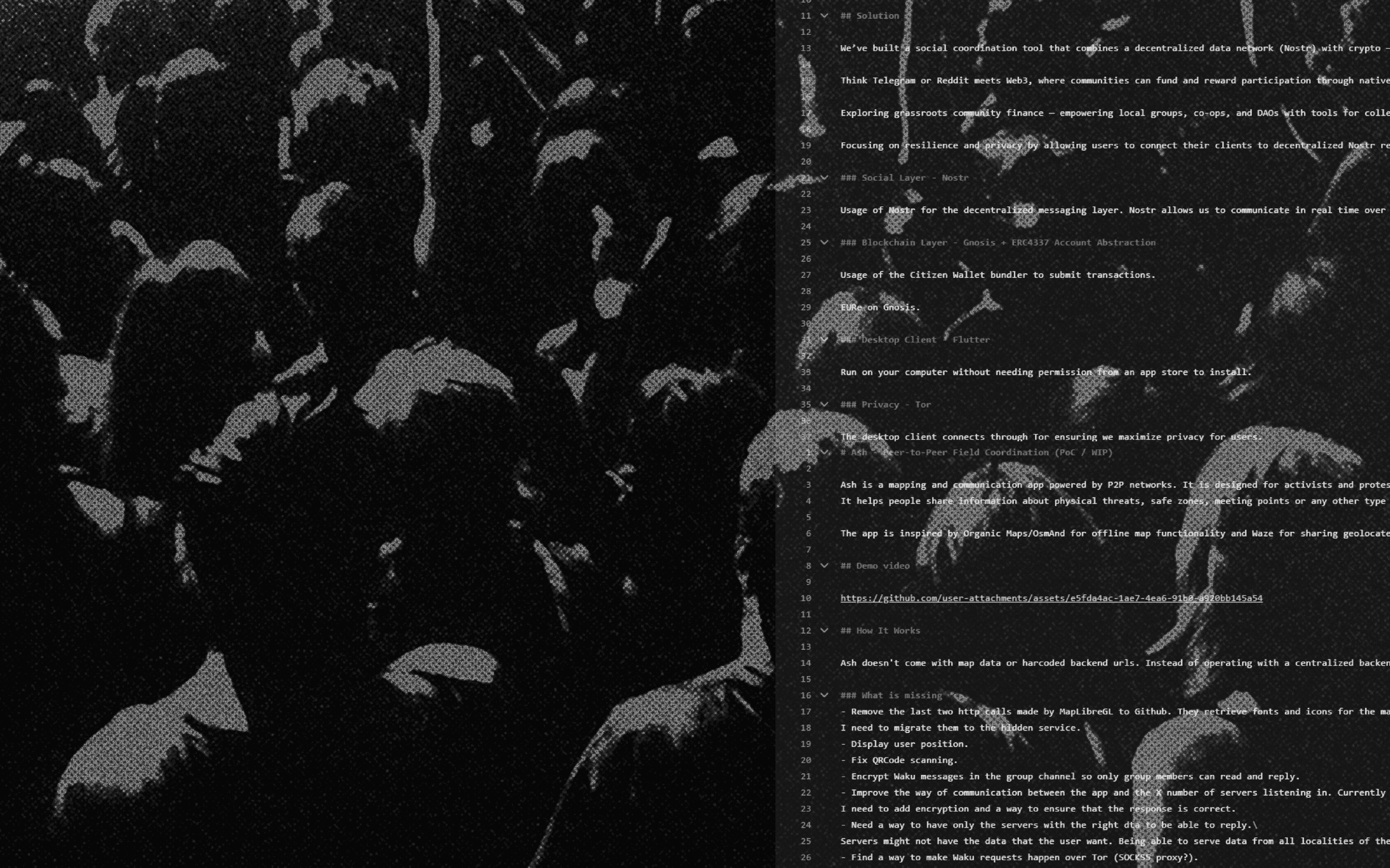Hacking for Real World Impact with Funding the Commons & Tor
Celebrating the innovators building much-needed privacy tools at the Logos-sponsored RealFi Hack
Logos


With the winning entries now announced, let’s explore the standout projects and how they leverage Logos technologies to protect activists standing up for freedom and everyday people concerned about surveillance and censorship.
RealFi Hack Winners: Resilient Activist Technology Track
Ash
Ash is a peer-to-peer coordination tool designed for activists who need secure, resilient communication. Built on the Waku decentralised messaging network and using the Arti Tor client in Rust, Ash lets users coordinate without depending on central servers that could be monitored, blocked, or taken down.
Activists can pre-download map tiles through the Tor network for offline use, ensuring they can still navigate or communicate if internet bandwidth is limited or censored. Within Ash, encrypted group chats allow users to drop map markers for safe zones, meeting points, hazards, or police movement, creating live, shared situational awareness without exposing data to outside observers.
Ash’s architecture is somewhat decentralised, meaning there’s no single point of failure for communications: even if one node goes down or connectivity is disrupted, the network functions. Meanwhile, its use of Tor anonymises data requests, reducing the risk of revealing users’ locations or focus areas. While the map download feature currently runs from a single server behind Tor, there are plans to decentralise the project further by implementing Codex or another decentralised file storage network.
For activists, Ash means practical protection and coordination in volatile conditions. It provides the ability to organise collectively, stay informed in real time, and move safely, even under surveillance or network suppression.
The project’s developer described their motivations to build Ash:
ComuniFi
ComuniFi is a censorship-resistant coordination and community-finance tool designed for groups organising under pressure.
It combines the decentralised social and messaging protocol Nostr with onchain payments on the Gnosis network using EURe stablecoins and ERC-4337 account abstraction. In practice, that means communication and funding operate side by side, without relying on a company-controlled server or payment platform.
The desktop Flutter client routes all traffic through Tor, adding a privacy layer that conceals metadata and protects user identities. In the project’s demo, two Tor-connected clients coordinated a request and completed a €25 EURe transfer across borders, providing a practical example of how mutual-aid or emergency funds could be routed securely when legacy payment and communication options are blocked or monitored.
For activists, ComuniFi offers clear real-world advantages. It enables resilient group chat and coordination over open standards; the ability to post structured requests (such as rides, supplies, or legal support); and transparent, onchain fulfilment of those needs.
Because Nostr relays are federated, communities can choose or host their own, avoiding single points of failure and aligning their infrastructure with their values.
In short, ComuniFi provides a way to communicate and move resources securely in hostile environments, while ensuring community networks are interoperable, portable, and much harder to silence.
Hackathon mentor and Logos contributor Vaclav commented on ComuniFi:
RealFi Hack Winners: Logos x Tor Privacy Infrastructure Track
Shielded Micropay (aka Hidden Payment Channels)
Shielded Micropay is a privacy-preserving payment protocol designed for low-cost, pay-per-request transactions over private infrastructure.
Built using Railgun and payment channels, it enables users to privately pay for decentralised services, such as RPC nodes, AI inference, or data APIs, without revealing who is paying, how much they paid, or what it was for. Instead of broadcasting every payment onchain, Shielded Micropay batches multiple offchain transactions and only settles the net result, keeping transaction fees low and metadata hidden.
This allows service providers to operate anonymously through Tor or other hidden networks while still receiving payments in real time. Clients can access paid resources without linking their activity to an onchain identity. By combining the efficiency of payment channels with Railgun’s shielded privacy, Shielded Micropay enables private, censorship-resistant commerce.
Shielded Micropay was an entry for Gitcoin GG24, and the project has a lot of overlap with an existing initiative led by the Waku team.
Commenting on Shielded Micropay, Logos contributor and hackathon mentor Vaclav said:
The project’s developer described their motivations to build Shielded Micropay:
Explore Shielded Micropay on GitHub.
Tohaku
Tohaku is a privacy-preserving Ethereum wallet built on Ambire Wallet (the Kohaku extension). The wallet routes activity through Tor or the Nym mixnet to protect users from RPC-level surveillance and metadata leakage.
Rather than changing how you sign transactions, Tohaku changes how your wallet talks to the network. Balance checks, nonce queries, and sends are proxied via privacy networks, reducing the chance that relayers or RPC providers can connect your network identity to your onchain addresses.
The entry also explores a “one account per DApp” compartmentalisation philosophy to limit cross-context tracking. It’s explicitly a research build (not production), with an emphasis on empirical measurements and trade-off analysis between latency, reliability, and privacy across Tor vs Nym.
Tohaku should be of particular interest to activists wanting to protect their activities from surveillance, traders mitigating MEV-exposure signals, and anyone who believes in the right to read and write to blockchains without being profiled. The project is a practical probe into wallet-level privacy that complements onchain techniques with robust network-layer protections.
Logos contributor and hackathon mentor Vaclav said the following about Tohaku:
Next Up for Privacy in Practice
With the RealFi Hack now over, we’re entering the next phase of the Privacy in Practice campaign. First, we’re sponsoring Funding the Commons’ Builder Residency from 24 Oct. to 14 Nov., which will take place in Buenos Aires ahead of this year’s Devconnect conference.
Logos contributors will focus on prototyping an innovative identity solution with Keycard at the residency. The idea is to give displaced and disconnected communities a secure, offline means of managing identity and resources. Learn more about the initiative and the Builder Residency.
After the Builder Residency, Logos contributors will be at the Funding the Commons conference on 19 Nov. to announce an exciting new campaign to support the Tor Project. We’ll also be distributing copies of Farewell to Westphalia, the recently published book coauthored by Logos cofounder, Jarrad Hope, and the author of Crypto Anarchy, Cyberstates, and Pirate Utopias, Peter Ludlow. We hope to see you there.
Logos is a movement to rebuild civil society using decentralised technologies and collective action. We actively support those building tools to protect the digital rights of activists and everyday people. If our mission speaks to you, contribute to the movement today.
Discussion
Logos
Jarrad Hope
Dr. Corey Petty
Logos
Logos
Logos
Logos
Logos
Logos
Logos
Logos
Logos
Logos